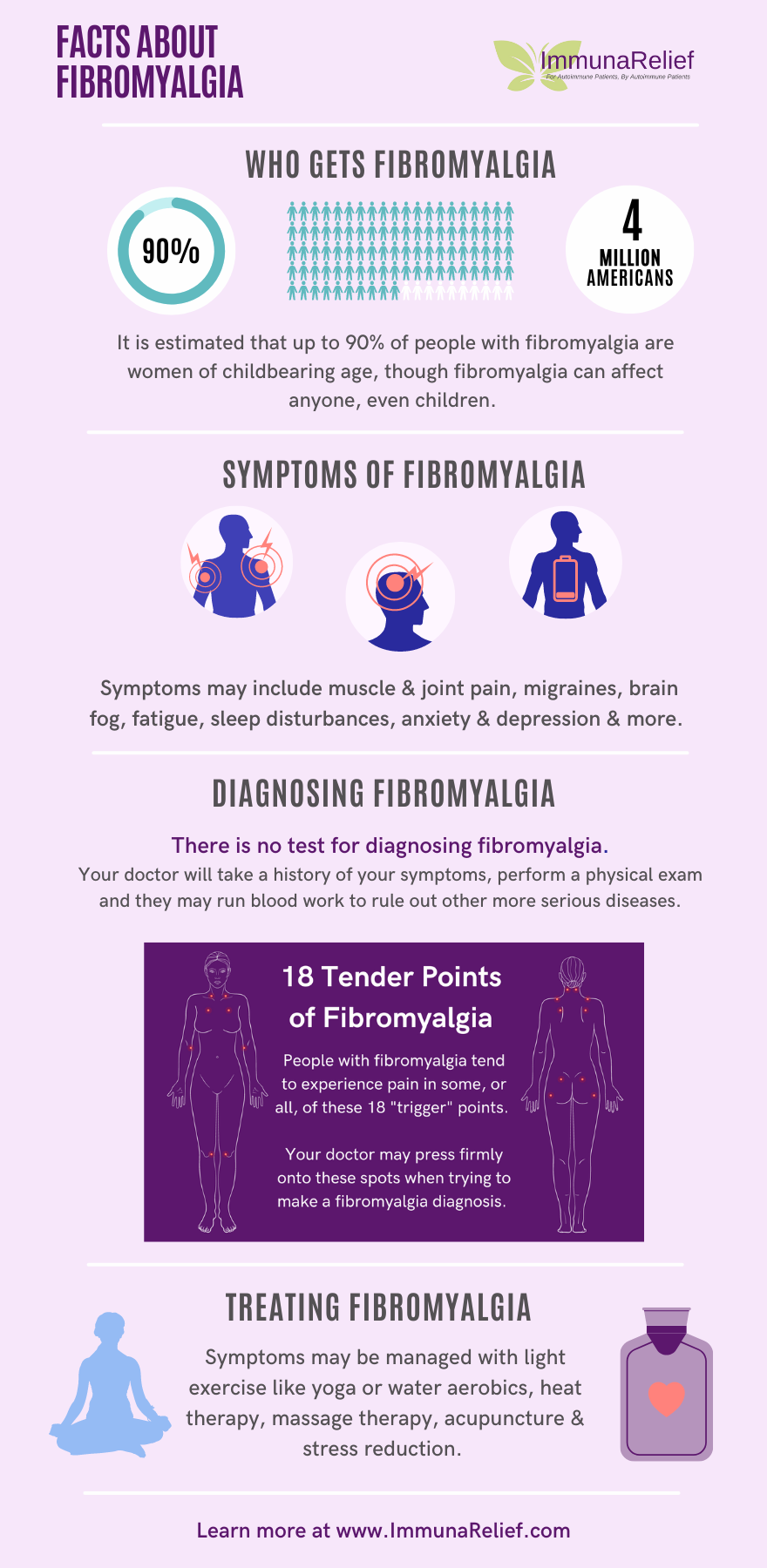Everything You Need to Know About Fibromyalgia
(For a copy of this infographic, send an email to support@immunarelief.com)
Fibromyalgia Wiki
What is fibromyalgia?
Fibromyalgia is a chronic (long-term) disorder that causes widespread musculoskeletal pain as well as fatigue, sleep disturbances and more. While doctors don't have a great understanding of what fibromyalgia actually is, it is believed to be a neurological disorder affecting the way the central nervous system perceives pain.
While fibromyalgia is not an autoimmune disorder, it is commonly seen alongside autoimmune diseases.
Who Does Fibromyalgia Affect?
While fibromyalgia can affect anyone, even children, it's most commonly seen in people aged 25 to 55 years old. The older a person gets, the more likely they are to be diagnosed with fibro. It's estimated that 70-90% of people with fibromyalgia are women of childbearing age and it's believed that hormones, stress, pregnancy and menopause may all be factors in developing fibromyalgia.
Approximately 4 million Americans (4% of the population) have fibromyalgia with 1 in 20 people worldwide are believed to have fibro.
Common Symptoms of Fibromyalgia
Fibromyalgia can cause severe pain in the joints, muscles, tendons and other soft tissues. In addition to pain, fibromyalgia can commonly cause sleeping issues like insomnia and sleep disturbances, headaches and migraines, depression and anxiety, difficulty concentrating and brain fog.
Diagnosing Fibromyalgia
Unfortunately there is not a blood test for fibromyalgia so it can be tough for doctors to diagnose. Fibromyalgia pain and fatigue can often mimic autoimmune disease so doctors will often run blood work to rule out disease like Systemic Lupus, Rheumatoid Arthritis and Sjögren's Syndrome.
Some of the bloodwork your doctors might request can include (but are not limited to):
- Anti-nuclear antibodies (ANA)
- Complete blood counts (CBC)
- Anti-dsDNA antibodies
- Rheumatoid Factor
- Anti-ro (SSA) and Anti-la (SSB) antibodies
Your doctor may also order a urinalysis and x-rays to check your joints. These blood tests can help rule out the possibility of an autoimmune disease.
Your doctor may also do a tender point test where they press into a serious of 18 so-called tender points around the body to see if they are hurt when pressed into. The 18 "trigger" points are in various places on the body including neck, upper back, chest, buttocks, knees and elbows. This test can aid in a diagnosis.

Managing the Symptoms of Fibromyalgia
Fibromyalgia can be managed by a combination of gentle exercise, physical therapy, heat therapy, warm water therapy and sometimes medication. Some people find that massages are very helpful in managing the pain and stress of fibromyalgia, though others might find it causes them more pain.
Sometimes your doctor might prescribe an antidepressant like Cymbalta or Gabapentin which may help reduce pain, help better manage stress and sometimes aid in better sleep.
It can also be very helpful to join online or local support groups to chat with other people who understand the experience of living with fibromyalgia.
Common Comorbidities
What is a comorbidity?
A comorbidity is when a person has two or more long-term chronic illnesses at the same time. Unfortunately fibromyalgia has quite a large number of comorbidities and is often seen alongside autoimmune diseases or other chronic disorders.
Common fibro comorbidities include:
- Systemic Lupus Erythematosus
- Rheumatoid Arthritis
- Irritable Bowel Syndrome
- Migraines
- Interstitial Cystitis (Painful Bladder Syndrome)
- Temporomandibular joint disorders (TMJ)
- Depression
- Postural Orthostatic Tachycardia Syndrome (POTS)
- Myalgic Encephalomyelitis/Chronic Fatigue Syndrome (ME/CFS)
Fibromyalgia & CBD Oil
Fibromyalgia is a chronic pain disorder characterized by widespread musculoskeletal pain, fatigue and tenderness in localized areas of the body (see: tender points). Some people with fibromyalgia like to use more natural methods of managing their pain and other symptoms and CBD oil has gained attention for its potential anti-inflammatory and analgesic (pain-relieving) properties.
CBD is one of the many compounds found in the cannabis plant and it does not produce the psychoactive effects associated with THC (tetrahydrocannabinol). CBD interacts with the endocannabinoid system in the body, which plays a role in regulating pain, mood and sleep.
While the scientific research is still limited and more high-quality, well-designed clinical trials are needed to better understand the effects of CBD on fibromyalgia, early evidence suggests that CBD might be effective in managing fibro pain.
Fibromyalgia FAQ's
Is fibromyalgia and autoimmune disease?
No, fibromyalgia is not considered to be an autoimmune disease but instead a neurological disorder that affects a person's sensory processing system.
What is a fibromyalgia flare?
A flare is when your symptoms increase for a temporary period of time. This could be a combination of an increase in pain and fatigue, headaches, brain fog, etc.

What causes a fibromyalgia flare?
Stress can be a huge factor in sending a person with fibromyalgia into a flare. For some women, they tend to experience flares during their menstrual cycles and/or after a pregnancy and hormones are believed to play a role in fibromyalgia.
When is Fibromyalgia Awareness Month?
Every year Fibromyalgia Awareness Month is held during May, with May 12th being designated as National Fibromyalgia Awareness Day. Fibromyalgia Awareness Month is designed to help bring better awareness to what Fibromyalgia is and what its like to live with this disease.

